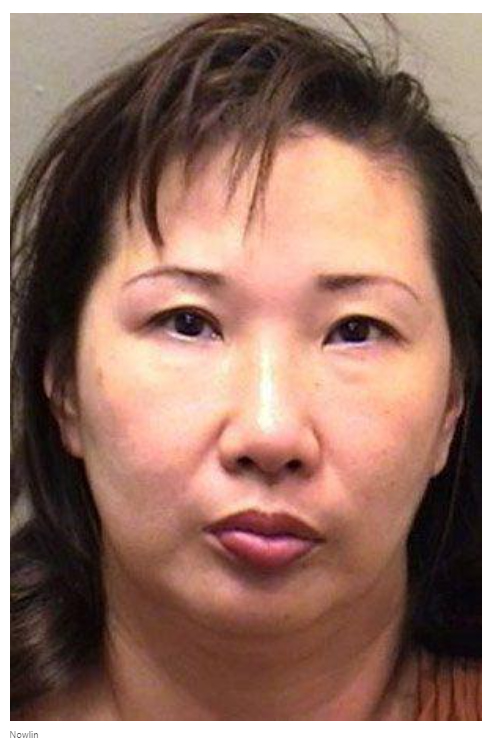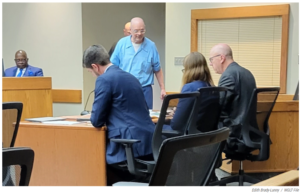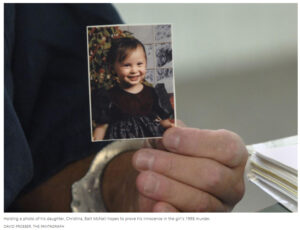Misook FAILS Polygraph Exam that asks 4 key questions regarding the evening of the murder such as “did you suffocate Christina?”

If you were to listen to Bloomington Police Detectives and McLean County Prosecutors involved in Barton’s case, they will say that Misook was never considered a suspect. Even though Detective Larry Shepherd, lead assigned detective in the case, even invoked the word “suspect” in telling a grand jury he had eliminated her as a suspect. Despite at the time of his telling the grand jury he had eliminated her, subpoena’s had been issued for Misook’s phone records and she was requested to submit to a Polygraph Examination, otherwise known as a “Lie Detector Test” that was yet to take place.
Polygraph exam results are inadmissible as evidence in court but can help shape an investigation leading police to focus on an individual like Misook more. They can be used by Detectives in order to evaluate whether a suspect is being truthful or not. If found to be untruthful, then more investigative digging is warranted.
Barton was never given a Polygraph Exam, even though he volunteered on a number of occasions to take it in order to show all of his statements and knowledge concerning his daughter’s death were truthful. Despite his willingness to take an exam, Bloomington Police did not want to. Likely as it would show in all instances his being truthful.
Attached we have the full report, a rarity in the public’s eye, and should be a treat for everyone to see.
When taking a polygraph examination standard questions that are straight forward and easy to answer are asked of the subject in order to create a baseline. Questions like “what is your full name? Where do you live? When and where were you born?”
The baseline then is compared to questions that are more specific as to the crime that was perpetrated itself.
Misook was asked four probing and specific questions surrounding Christina’s murder, and Misook failed every single one of them showing signs of increased heartbeat and other signs of nervousness that in turn indicate deception. The questions she was asked were:
- On June 16 (1998) did you suffocate Christina McNeil at Barton McNeil’s apartment? Answer: No
- Did you suffocate Christina McNeil? Answer: No
- On June 16 (1998) did you enter Barton McNeil’s apartment between midnight and seven A.M.? Answer: No
- Were you at Barton McNeil’s apartment when Christina was suffocated? Answer: No
As the Polygraph Exam did not take place until several weeks after Barton had been arrested, and the lead detective Larry Shepherd had already made his declaration to the Grand Jury that Misook in his view was no longer a suspect, how then to explain the huge and obvious failing of Misook of her Polygraph Exam?
By filing away the report never to be seen again with your opinion that Misook failed on her four questions all for the sake that there existed “language barriers”. Meanwhile Misook was known to have consorted with U.S. servicemen in Korea for years before she met and married her U.S. Serviceman Andy Nowlin who brought her back to live in Heyworth, Illinois, in 1988-1989.
So besides having already learned English while living in Korea, she then lived in the United States for approximately ten years before murdering Christina. And was so proficient at English that she was hired by a business called Anderson Financial that was subcontracted by AT&T so that any questions Korean had concerning their bill Misook could then answer since she could read and speak English. So it can be refuted Misook failed these four key questions due to language barrier issues. She knew full well what the questions were she was asked and how to answer accordingly. These are very basis and simple questions after all.
This pattern of disregarding evidence that points to Misook any person that becomes familiar with this disturbing case of injustice throughout the course of the Barton McNeil murder case.
Time and time again incriminating items exclusively point to Misook, yet are always systematically discounted and ignored by the investigators and prosecutors. After all, Barton has now been in prison for over a month and if they now suddenly free him and charge Misook, Bart would likely have a legal claim of some kind for false arrest. Better to go “all in”.
As a result of Bloomington Police failings, Barton lost his life, his daughter never attained the justice she deserved, and an elderly woman, Misook’s mother-in-law, was murdered. So one murder becomes in effect three murders because of all of their short-sightedness.
Who is to blame? Most certainly the trio of then acting State’s Attorney Charles Reynard, then acting First Assistant Teena Griffin and then acting lead Detective on the case, Larry Shepherd. Everyone else played supporting roles either wittingly or unwittingly. Some might even say of everyone involved in the wrongful conviction of Barton McNeil as being “accomplices under the color of law”.




